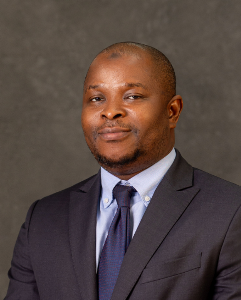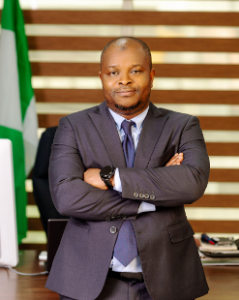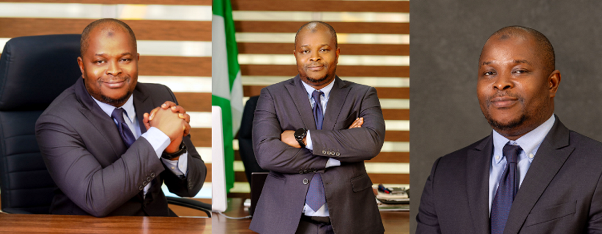Professor Ibrahim Adeyanju, the CEO/Managing Director of Galaxy Backbone Limited (GBB), Nigeria’s state-owned information technology and shared services provider, is steering the organization through a critical phase of transformation. Since his appointment in February 2024, Adeyanju has emphasized a clear strategic shift. GBB no longer wants to be just an infrastructure company, it is evolving into a multi-sector solutions provider, building resilience and trust while deepening collaborations with both public and private stakeholders.
In this exclusive conversation with the IT Edge News.Africa team—Olusegun Oruame, Nana Theresa Timothy, and Raihanatu Saleh Hassan—Adeyanju highlights how GBB is redefining its mandate to align with Nigeria’s broader digitalization agenda under the Renewed Hope framework. He explains why Federal MDAs remain the backbone of GBB’s operations, how government investments in broadband and data centres safeguard digital sovereignty, and why GBB is not competing but partnering with private sector players to strengthen the national ICT ecosystem.
Adeyanju points to GBB’s extensive fibre rollout across 28 states, its Tier-III and Tier-IV data centres in Abuja and Kano, and its 1Government Cloud platform as examples of services that ensure business continuity for government agencies and beyond even in periods of delayed public funding. He stresses that GBB’s strength lies not just in infrastructure but also in solutions that guarantee efficiency, cyber-security, and digital trust.
Looking ahead, Adeyanju outlines the company’s Integrated Digital Transformation Strategy (2025–2028), built on pillars of Resilient Digital Infrastructure, Integrated Digital Ecosystem, Innovative service delivery, Digital Literacy & Trust and financial sustainability and value creation. He shares his ambition to expand GBB’s relevance beyond Nigeria’s federal MDAs to state governments, private enterprises, and even regional partners across West and Central Africa.
Blending his academic grounding as a professor with executive leadership, Adeyanju is keen on positioning GBB as an enabler of Nigeria’s digital economy. Under his watch, the company is tackling internal challenges, optimizing its workforce, and aiming to become a regional digital hub to secure Nigeria’s place in the fast-changing global ICT landscape.
Federal MDAs will remain central to Galaxy Backbone’s mandates
How do you respond to the view that Federal MDAs are the lifeblood of Galaxy Backbone Limited (GBB). Without a stronger Nigeria First policy on data sovereignty and digital infrastructure, some argue GBB risks losing ground to private sector competitors. Where do you stand in relation to private sector competition?
Answer: I think to answer the question, we need to understand the genesis of Galaxy Backbone and the role it plays in government. Fortunately, you’ve been writing about Galaxy Backbone for a while. So, you would understand that the setup of Galaxy Backbone was to pull resources of government together. What that means is that there would be economy of scale. Rather than each MDA procuring ICT services, government, in its wisdom in 2006, thought that bringing that into a single envelope would help it to save costs. So, to answer the question correctly, the first thing is that the federal MDAs are central and will remain central to Galaxy Backbone’s mandates.

Prof. Ibrahim Adeyanju
But the other aspect that’s very important to note is that government has invested a lot in terms of infrastructure. If you knew about the NICTIB Initiative, the Nigeria’s National Information and Communication Technology (ICT) Infrastructure Backbone, government started that project as far back as 2008. The whole idea was to improve broadband access, improve connectivity, and ensure that government can serve its own agencies. For me, there are two things that are very important. One is government has invested so much in setting up its IT infrastructure. So, if government has invested so much in setting up its IT infrastructure and government does not use its own IT infrastructure, the question then is who is losing?
The other aspect is about business continuity. I’m not sure you are aware of the budget this year. Last year’s budget is just being rounded up. That’s 2024 budget and as for 2025 budget for capital projects, nothing has been released to a large extent for any of the MDAs. We are in the ninth month of the year. The implication is that for digitization and ICT services, without Galaxy Backbone covering that deficit or gap in government, none of the MDAs will be with ICT services, right?
There’s a big aspect of business continuity driven by Galaxy Backbone. Would the private sector be able to cover a year gap of non-funding waiting for government? Of course not! Those are unwritten things that people don’t understand about Galaxy Backbone. So yes, there’s a purpose for setting up Galaxy Backbone.
Private sector actors are not competitors but collaborators
The first policy on data sovereignty is of course, also important. We should understand that government has invested a lot in providing world class ICT infrastructure, which Galaxy Backbone manages. Therefore, government banks on Galaxy Backbone to ensure that infrastructure is being properly utilized to provide services, not just to government, but also to private enterprises.
“For 2025 budget for capital projects, nothing has been released to a large extent for any of the MDAs. We are in the ninth month of the year. The implication is that for digitization and ICT services, without Galaxy Backbone covering that deficit or gap in government, none of the MDAs will be with ICT services. There’s a big aspect of business continuity driven by Galaxy Backbone. Would the private sector be able to cover a year gap of non-funding waiting for government?
One other aspect is that we do not see the private sector as competitors. We see them as collaborators because we actually work with a lot of private sector to provide services to government. For example, in terms of our redundancy, we work with MTN, Airtel, Equinix, and WIOCC to provide services that we cannot.
So, rather than the government bearing that service individually, we aggregate and based on that aggregation, we pay to MTN, Airtel, and the likes to then provide that service to governments. We’ve had a lot of partnership with different private sector players to ensure that government gets the best from those ICT services.
Powering FG’s Digital Transformation under Renewed Hope Agenda
What role is GBB playing in advancing Nigeria’s digital transformation—through robust infrastructure, innovative service delivery, and strategic partnerships? Since you assumed office, how would you assess progress in areas such as fibre optic rollout, data centre expansion, and state-level collaborations?
Thank you, Nana, for the question about the role of Galaxy in digital transformation. I will say we play a very central role in the digital transformation of the federal government’s digitalization agenda, and that’s under the Renewed hope Agenda. Our mandate falls squarely under the Pillar Seven or Eight that talks about accelerating the diversification of the economy through digitalization and a few other things. Now, for infrastructure, we have our backbone fiber covering 28 states out of 36 states invested by the federal government.
Within Abuja alone, we have over 1,000 kilometres of metro fibre that’s being managed by Galaxy Backbone. We use this to provide connectivity to all the MDAs within the Abuja metropolis. We also offer similar infrastructure in other states that connect to the federal secretariat. We have two data centres.
We have a Tier III Data center here in Abuja and another Tier- IV data centre in Kano. With the data centres, we’re able to provide cloud hosting services, co-location services, similar to what Amazon, Google, and Azure are providing. That ensures that government is well protected in terms of digital sovereignty, in terms of confidentiality, ensuring that our confidential data are not kept offshore.
On service delivery, we have internet connectivity through fiber; cloud services; and unified communication to government agencies. We also provide co-location services, and a lot of add-ons. For example, we have what we call the 1Government Cloud, which is an electronic content management system that allows automation of workflows, electronic document management, and ensures that approvals can be given digitally rather than manually.
“Government banks on Galaxy Backbone to ensure that infrastructure is being properly utilized to provide services, not just to government, but also to private enterprises.”
We also have a lot of certifications. I dare to say that Galaxy Backbone is one of the few either government agencies or private companies that has up to six international certifications. We have a number of certifications; the information security and management systems (ISMS), ISO 27001; the IT service management system(SMS), ISO 20000, the Quality Management Systems(QMS), ISO 9001:2015, the business continuity management system(BCMS) ISO 22301, PCI DSS, and even the National Data Protection. We subscribe and maintain these certifications and some of them we’ve maintained as far back as 2011.
Driving Nationwide Service Rollout through Strategic Partnerships
For partnership, yes, we understand that the infrastructure we have is not just for federal MDAs, but for the entire nation, because it’s something that spans 28 states, Therefore, we are working not just with federal agencies, but, with state governors and the state Agencies. We’ve had engagements with the governors of Plateau, Zamfara, Benue, Adamawa, Bauchi and so many other. There are some services based on our infrastructure that we are providing to them. We also have partnership with the private sector, like I said earlier.
The first partnership we have is that a lot of times we have what we call fiber swap, wherein we provide redundancy for them based on the routes they’re taking their connectivity through. They also provide redundancy for us if they have fiber across the same routes.

Prof. Ibrahim Adeyanju
Still on services, we have some banks currently that are hosted within our data centres. We have quite a number of private sector enterprises that we give connectivity, including quite a number of hotels in Abuja. We have enterprises that we give our cloud services. We work on training with other government agencies in terms of training the public sector, as well as others in the private sector.
One big area we actually play, which might not be as obvious, is the cyber-security arena, wherein we provide security for a lot of data that we keep. We are really big on cyber-security so we have a state of the art Security Operations Centre (SOC) from where we protect all data on our infrastructure from all forms of cyber attacks.
Staying focused to delivering innovative services in spite of numerous challenges
There are challenges, no doubt. As recent as last week or two weeks ago, we had an issue with a fiber that runs from Lagos to Ibadan. There was another company that was dealing with laying gas pipeline and either directly or indirectly, they cut fibers in a number of places as they were doing their work. The major challenge you have with fiber optics is this issue of road construction. In Abuja, for example, there was a time we had people throwing fire in our manholes looking for rats.
“We do not see the private sector as competitors. We see them as collaborators because we actually work with a lot of private sector actors to provide services to government. For example, in terms of our redundancy, we work.”
All these have an impact on the quality of service that we can deliver because some of those force majeure are man-made. That’s one of the reasons why the current government has declared telecoms infrastructure as a Critical National Information Infrastructure that should be protected, similar to the way we protect our pipelines, and electricity infrastructure. Things are looking up. There is a bit more of broadband penetration, and it’s going to get better because the investment will not just come from the governments, but we have private players that are also investing in expanding their fiber optic layouts.
In the face of operational challenges, what strategies are you putting in place to sustain profitability and reinforce your vision for GBB since your appointment in February 2024?
Thank you, Raihanatu, for that question. Since we’ve been on board for close to over 18 months now, and we, of course, have met challenges. We’re dealing with those challenges. One milestone we’ve been able to come up with is to come up with what we call our Integrated Digital Transformation Strategy. It’s supposed to run for about four years, from 2025 to 2028.
Now, that strategy lays out some of the things that are very important for us at Galaxy Backbone, and that includes resilience, okay? Resilience of our infrastructure, ensuring that our infrastructure is not just current, but improving over time.
Building Trust: The Key to GBB’s Leadership in the Ecosystem
We are focused on delivering innovative services and we are continuously improving our service delivery, not just to MDAs, but to the private sector to ensure that our customers are happy. Another pillar of our strategy is what we call Digital Leadership and Trust. That has to do with our understanding that we work in an ecosystem where we must be Number One; Galaxy Backbone wants to continue to be a leader in that ecosystem. We want our customers, the government, and our stakeholders to trust us because they’re keeping a lot of data with us and the trust is very important.
We have a pillar that deals with Integrated Digital Ecosystem and that says that, yes, we are government owned, but we understand that we work in an ecosystem where there needs to be partnership. We see ourselves as an enabler, as a platform and an aggregator. So as an enabler, we need to work with other partners within the government and outside governments to ensure that our services are reliable and they continue to be available.
“One of the dreams of the current management is to evolve from being a pure infrastructure provider to a complete solution provider. We’re not just saying we have the infrastructure, but we’re also ensuring that the infrastructure is properly utilized. We want to go beyond infrastructure to provide applications and solutions that utilize the infrastructure effectively. That’s our goal as a management over the next two to three years.”
There’s the other issue of financial sustainability, which is very important. But one thing we need to note is that for us, not just about financial sustainability, but there’s also the issue of value creation. There are lots of services we provide to government agencies or government actors that are not paid for as we must support the Renewed hope Agenda of the current government. We must ensure that there is business continuity in government.
Optimizing Infrastructure as a Catalyst for National Development
Our strategy is quite comprehensive and it covers that spectrum of resilience, financial, sustainability, value creation, innovative digital, innovative service delivery that integrate ecosystem among others. In terms of profitability, one of the things we’ve done since we came on board is to expand our engagements. Expand our engagement from just looking at federal MDAs to engage the states.
That’s why we are engaging quite a number of governors. We currently have services we are providing to Zamfara state government. We’re working on Bauchi state government to provide services again as well as Adamawa, Benue and also a couple of other states. What we’ve done as a new management is to ensure utilization of the government infrastructure, because what we met was that infrastructure was being a bit underutilized. We felt that’s an infrastructures that’s very important for national development.
As I said earlier, we’re not just looking at the federal MDAs but the state governments too. They need to key into using this infrastructure as well as the private enterprise to ensure that the purpose for which it was originally designed is met. Our dream is to ensure that Galaxy Backbone becomes a regional digital hub, not just for Nigeria, but for West Africa and even Central Africa.
We believe the infrastructure we have can be expanded, can be extended into neighbouring countries. We have some ongoing discussion with some government actors in Niger Republic, so we’re not just looking at Nigeria. We’re looking beyond the shores of Nigeria based on the infrastructure we have. And we are very sure that that infrastructure cannot just sustain the federal government, but state governments and private enterprises, as well as international collaborators outside Nigeria.
We are confident of success through government supports, private collaboration. I must thank our workforce as well. We have a very professional workforce. A lot of our tech staff came in from abroad and this is as far back as 2008, 2010. For somebody working abroad, working in the UK to be brought back to Nigeria to work for Galaxy Backbone is significant. That shows the quality of staff that we have and we want to continue to maintain that to keep strengthening our digital processes.
I need to mention one of the dreams of the current management is to evolve from being a pure infrastructure provider to a complete solution provider. What that means is that we’re not just saying, oh, we have the infrastructure, but we’re also ensuring that the infrastructure is properly utilized. You know, when you talk of digital services, they’re like three layers.
“Another pillar of our strategy is what we call Digital Leadership and Trust. That has to do with our understanding that we work in an ecosystem where we must be Number One; Galaxy Backbone wants to continue to be a leader in that ecosystem. We want our customers, the government, and our stakeholders to trust us because they’re keeping a lot of data with us and the trust is very important.”
The first layer is the connectivity layer, which is our fiber. That allows you to connect to the internet. The second layer is the data centre, wherein you’re able to store the data that moves through the internet. You’re able to store your own data.
But the third layer is the application layer. It’s about the solutions that work on your data centre, as well as using the internet. And that’s what we are evolving towards. We want to go beyond infrastructure to provide applications and solutions that utilize the infrastructure effectively. That’s our goal as a management over the next two to three years.
The Academic as a Strategic Enterprise Leader
I am going to round up with two-pronged questions. You are an academic, and a researcher of note. How do mix being an academic with managing a business enterprise?
I think it’s an interesting question because coming from the academia or rising to the peak of my academic career, there are lots of learnings, no doubts. The first thing I would say is that there are lots of transferable skills, even from the academia into the business world. Because when you move into the business world, especially if you’re moving in at the executive level, right? You’re looking at managing resources, you’re looking at managing humans and ensuring value creation for your stakeholders.
And that’s similar to some of the things we do in academia. Because I’ve had the opportunity to have risen through the rank up to becoming a professor, I’ve actually been involved in administrative duties. I’ve been the Head of Department. I’ve been a Deputy Dean. I’ve been a director within the academic space. In all of those responsibilities, I’ve had to manage resources, a lot of financial resources because as head of department, you’re dealing with your departmental floats.
“Our strategy is quite comprehensive and it covers that spectrum of resilience, financial, sustainability, value creation, innovative digital, innovative service delivery that integrate ecosystem among others.”
The only difference in terms of the academic and the business environment, from my perspective, would be the issue of profitability. Because in academia, we’re not looking at profitability. We’re looking at getting the work done or achieving your goal. But when it comes to the business environment, you’re not just looking at getting the work done, you’re looking at getting it done optimally and profitably.

Prof. Ibrahim Adeyanju
I think that makes a big difference in terms of the perspective. But the other truth is that once you move into business, the first thing you want to do is to understand the business environment. I’ve had to go on courses at Lagos Business School, do online courses to understand things I feel I wasn’t well grounded in. but it’s about being a fast learner. It’s about knowing what you want and knowing what is expected of you.
Some of the controversy before you assumed office centered on your predecessor as one who had overburdened Galaxy Backbone with overstaffing. How have you managed balancing the vision for productivity, securing the future of Galaxy Backbone with the inherent issues of running or manage as a civil service organization?
Answer: I think it’s part of the learning experience for Galaxy Backbone because if you’re in government, you need to understand government. The first thing to understand is that Galaxy Backbone is owned by the government and the way Nigeria is run, the government in power determines the way it wants to run things.
But what we’ve been able to do so far is despite those challenges, because either we like it or not, those that were employed were Nigerians. They are qualified Nigerians. What we had to do was to say, okay, how best do we optimize their use? What we did as a new management was to try and move things around, put people where they are best needed rather than feed the unemployment market. We don’t want to increase the unemployment in the country. So, we had to come up with strategies to optimize what we have.































